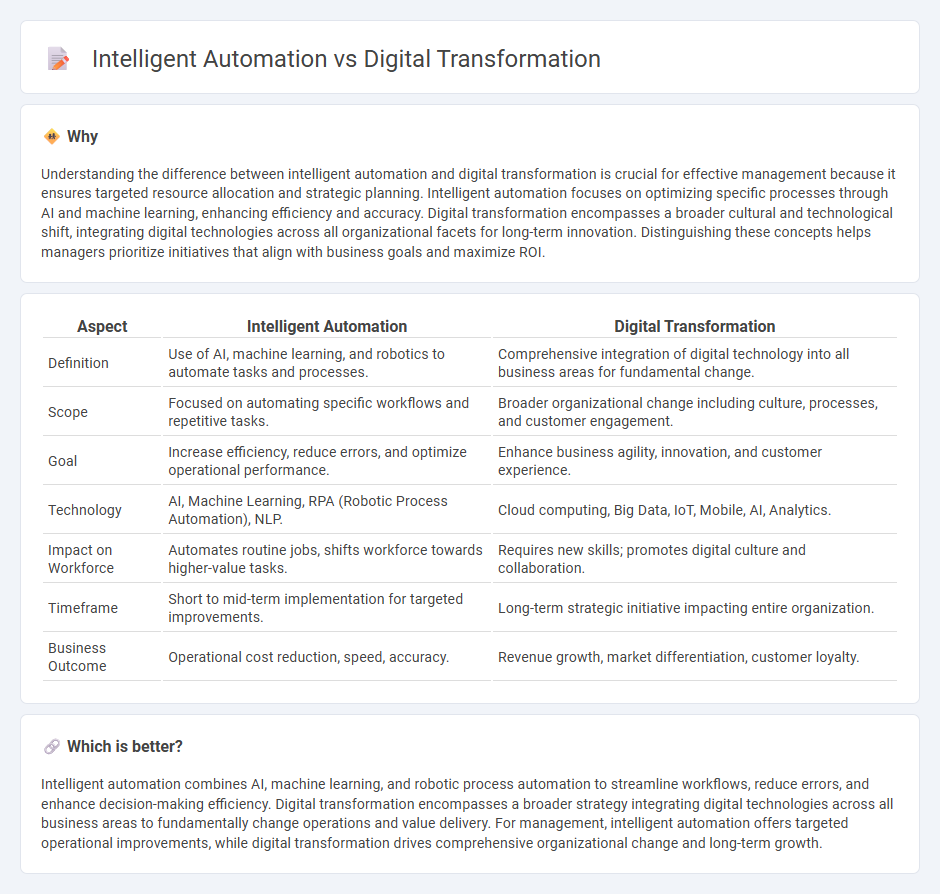
Intelligent automation leverages AI, machine learning, and robotics to optimize repetitive business processes, enhancing efficiency and accuracy within organizations. Digital transformation encompasses a broader scope, integrating digital technologies across all areas of a business to fundamentally change operations and deliver value to customers. Explore how combining intelligent automation with digital transformation strategies can revolutionize management practices.
Why it is important
Understanding the difference between intelligent automation and digital transformation is crucial for effective management because it ensures targeted resource allocation and strategic planning. Intelligent automation focuses on optimizing specific processes through AI and machine learning, enhancing efficiency and accuracy. Digital transformation encompasses a broader cultural and technological shift, integrating digital technologies across all organizational facets for long-term innovation. Distinguishing these concepts helps managers prioritize initiatives that align with business goals and maximize ROI.
Comparison Table
| Aspect | Intelligent Automation | Digital Transformation |
|---|---|---|
| Definition | Use of AI, machine learning, and robotics to automate tasks and processes. | Comprehensive integration of digital technology into all business areas for fundamental change. |
| Scope | Focused on automating specific workflows and repetitive tasks. | Broader organizational change including culture, processes, and customer engagement. |
| Goal | Increase efficiency, reduce errors, and optimize operational performance. | Enhance business agility, innovation, and customer experience. |
| Technology | AI, Machine Learning, RPA (Robotic Process Automation), NLP. | Cloud computing, Big Data, IoT, Mobile, AI, Analytics. |
| Impact on Workforce | Automates routine jobs, shifts workforce towards higher-value tasks. | Requires new skills; promotes digital culture and collaboration. |
| Timeframe | Short to mid-term implementation for targeted improvements. | Long-term strategic initiative impacting entire organization. |
| Business Outcome | Operational cost reduction, speed, accuracy. | Revenue growth, market differentiation, customer loyalty. |
Which is better?
Intelligent automation combines AI, machine learning, and robotic process automation to streamline workflows, reduce errors, and enhance decision-making efficiency. Digital transformation encompasses a broader strategy integrating digital technologies across all business areas to fundamentally change operations and value delivery. For management, intelligent automation offers targeted operational improvements, while digital transformation drives comprehensive organizational change and long-term growth.
Connection
Intelligent automation leverages AI technologies such as machine learning and robotic process automation to streamline workflows, directly driving digital transformation within organizations. Digital transformation integrates these intelligent systems into business processes, enhancing operational efficiency, data accuracy, and decision-making speed. The synergy between intelligent automation and digital transformation enables scalable innovation and sustainable competitive advantage in management practices.
Key Terms
Technology Adoption
Digital transformation emphasizes broad integration of digital technologies such as cloud computing, AI, and IoT to reinvent business processes and customer experiences. Intelligent automation specifically leverages AI-driven tools like robotic process automation (RPA) and machine learning to enhance operational efficiency by automating repetitive tasks. Explore in-depth insights on how organizations adopt these technologies to drive competitive advantage and innovation.
Process Optimization
Digital transformation leverages technologies like cloud computing, AI, and big data to revolutionize business processes and enhance overall efficiency. Intelligent automation combines robotic process automation (RPA) with AI-driven insights to streamline repetitive tasks and improve decision-making accuracy in process optimization. Explore how integrating these approaches can maximize your organization's operational performance and innovation potential.
Data-Driven Decision Making
Digital transformation leverages advanced technologies to enhance organizational processes, while intelligent automation employs AI and machine learning to optimize workflows and data analysis. Both focus on data-driven decision-making by integrating real-time insights and predictive analytics for improved accuracy and efficiency. Explore how combining these strategies can revolutionize business intelligence and operational excellence.
Source and External Links
What Is Digital Transformation? - Digital transformation is a business strategy that integrates digital technology across all organizational areas to modernize processes, products, and operations for customer-driven innovation and improved experience.
What is Digital Transformation: And why does it matter - Digital transformation is the process of using digital technologies to fundamentally change how businesses operate and deliver value to customers, driven by the convergence of people, business strategy, and emerging technologies.
20+ Most Mind-Blowing Examples of Digital Transformation - Digital transformation involves leveraging technology to enhance customer experience, streamline operations, and create new products or services, enabling businesses to stay competitive and adapt to market changes.
 dowidth.com
dowidth.com